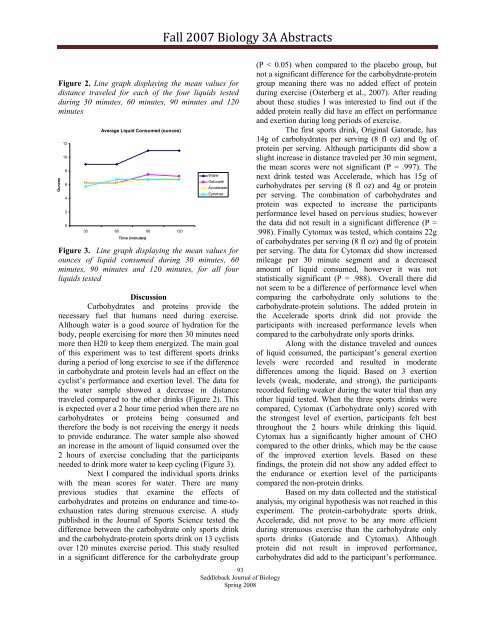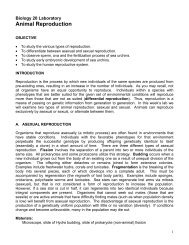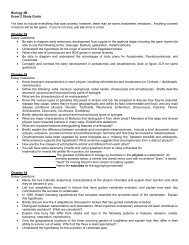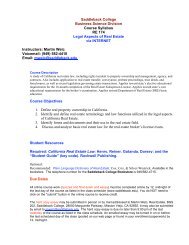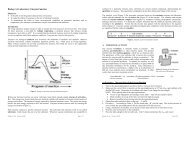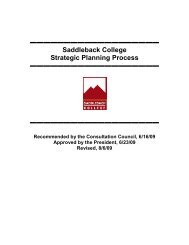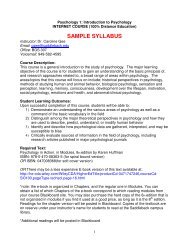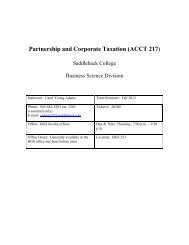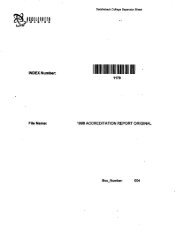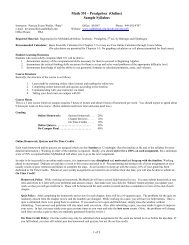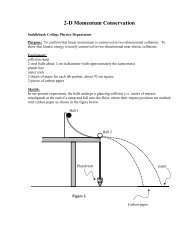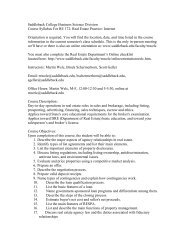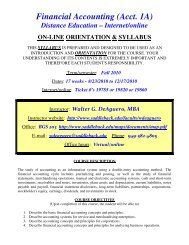Volume 6, Spring 2008 - Saddleback College
Volume 6, Spring 2008 - Saddleback College
Volume 6, Spring 2008 - Saddleback College
Create successful ePaper yourself
Turn your PDF publications into a flip-book with our unique Google optimized e-Paper software.
Fall 2007 Biology 3A Abstracts<br />
Figure 2. Line graph displaying the mean values for<br />
distance traveled for each of the four liquids tested<br />
during 30 minutes, 60 minutes, 90 minutes and 120<br />
minutes<br />
Ounces<br />
12<br />
10<br />
8<br />
6<br />
4<br />
2<br />
0<br />
Average Liquid Consumed (ounces)<br />
30 60 90 120<br />
Time (minutes)<br />
Water<br />
Gatorade<br />
Accelerade<br />
Cytomax<br />
Figure 3. Line graph displaying the mean values for<br />
ounces of liquid consumed during 30 minutes, 60<br />
minutes, 90 minutes and 120 minutes, for all four<br />
liquids tested<br />
Discussion<br />
Carbohydrates and proteins provide the<br />
necessary fuel that humans need during exercise.<br />
Although water is a good source of hydration for the<br />
body, people exercising for more then 30 minutes need<br />
more then H20 to keep them energized. The main goal<br />
of this experiment was to test different sports drinks<br />
during a period of long exercise to see if the difference<br />
in carbohydrate and protein levels had an effect on the<br />
cyclist’s performance and exertion level. The data for<br />
the water sample showed a decrease in distance<br />
traveled compared to the other drinks (Figure 2). This<br />
is expected over a 2 hour time period when there are no<br />
carbohydrates or proteins being consumed and<br />
therefore the body is not receiving the energy it needs<br />
to provide endurance. The water sample also showed<br />
an increase in the amount of liquid consumed over the<br />
2 hours of exercise concluding that the participants<br />
needed to drink more water to keep cycling (Figure 3).<br />
Next I compared the individual sports drinks<br />
with the mean scores for water. There are many<br />
previous studies that examine the effects of<br />
carbohydrates and proteins on endurance and time-toexhaustion<br />
rates during strenuous exercise. A study<br />
published in the Journal of Sports Science tested the<br />
difference between the carbohydrate only sports drink<br />
and the carbohydrate-protein sports drink on 13 cyclists<br />
over 120 minutes exercise period. This study resulted<br />
in a significant difference for the carbohydrate group<br />
93<br />
<strong>Saddleback</strong> Journal of Biology<br />
<strong>Spring</strong> <strong>2008</strong><br />
(P < 0.05) when compared to the placebo group, but<br />
not a significant difference for the carbohydrate-protein<br />
group meaning there was no added effect of protein<br />
during exercise (Osterberg et al., 2007). After reading<br />
about these studies I was interested to find out if the<br />
added protein really did have an effect on performance<br />
and exertion during long periods of exercise.<br />
The first sports drink, Original Gatorade, has<br />
14g of carbohydrates per serving (8 fl oz) and 0g of<br />
protein per serving. Although participants did show a<br />
slight increase in distance traveled per 30 min segment,<br />
the mean scores were not significant (P = .997). The<br />
next drink tested was Accelerade, which has 15g of<br />
carbohydrates per serving (8 fl oz) and 4g or protein<br />
per serving. The combination of carbohydrates and<br />
protein was expected to increase the participants<br />
performance level based on pervious studies; however<br />
the data did not result in a significant difference (P =<br />
.998). Finally Cytomax was tested, which contains 22g<br />
of carbohydrates per serving (8 fl oz) and 0g of protein<br />
per serving. The data for Cytomax did show increased<br />
mileage per 30 minute segment and a decreased<br />
amount of liquid consumed, however it was not<br />
statistically significant (P = .988). Overall there did<br />
not seem to be a difference of performance level when<br />
comparing the carbohydrate only solutions to the<br />
carbohydrate-protein solutions. The added protein in<br />
the Accelerade sports drink did not provide the<br />
participants with increased performance levels when<br />
compared to the carbohydrate only sports drinks.<br />
Along with the distance traveled and ounces<br />
of liquid consumed, the participant’s general exertion<br />
levels were recorded and resulted in moderate<br />
differences among the liquid. Based on 3 exertion<br />
levels (weak, moderate, and strong), the participants<br />
recorded feeling weaker during the water trial than any<br />
other liquid tested. When the three sports drinks were<br />
compared, Cytomax (Carbohydrate only) scored with<br />
the strongest level of exertion, participants felt best<br />
throughout the 2 hours while drinking this liquid.<br />
Cytomax has a significantly higher amount of CHO<br />
compared to the other drinks, which may be the cause<br />
of the improved exertion levels. Based on these<br />
findings, the protein did not show any added effect to<br />
the endurance or exertion level of the participants<br />
compared the non-protein drinks.<br />
Based on my data collected and the statistical<br />
analysis, my original hypothesis was not reached in this<br />
experiment. The protein-carbohydrate sports drink,<br />
Accelerade, did not prove to be any more efficient<br />
during strenuous exercise than the carbohydrate only<br />
sports drinks (Gatorade and Cytomax). Although<br />
protein did not result in improved performance,<br />
carbohydrates did add to the participant’s performance.


